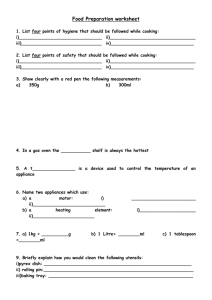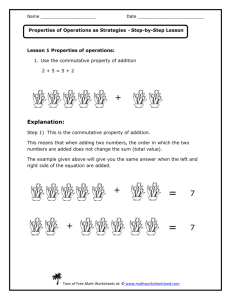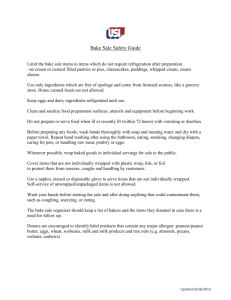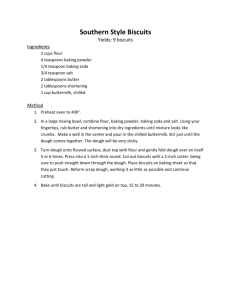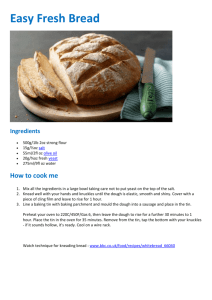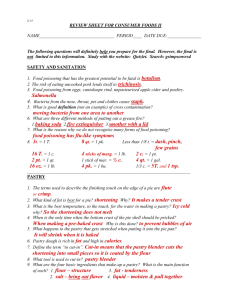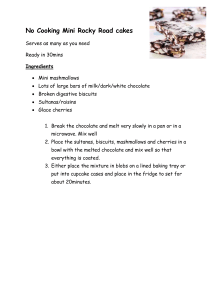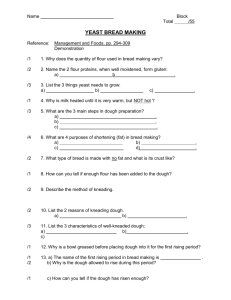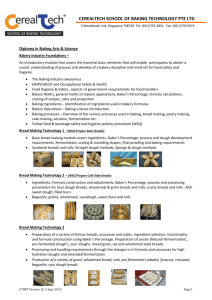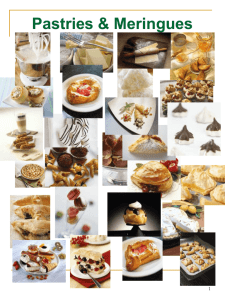Barkeeper Gastronomique
advertisement
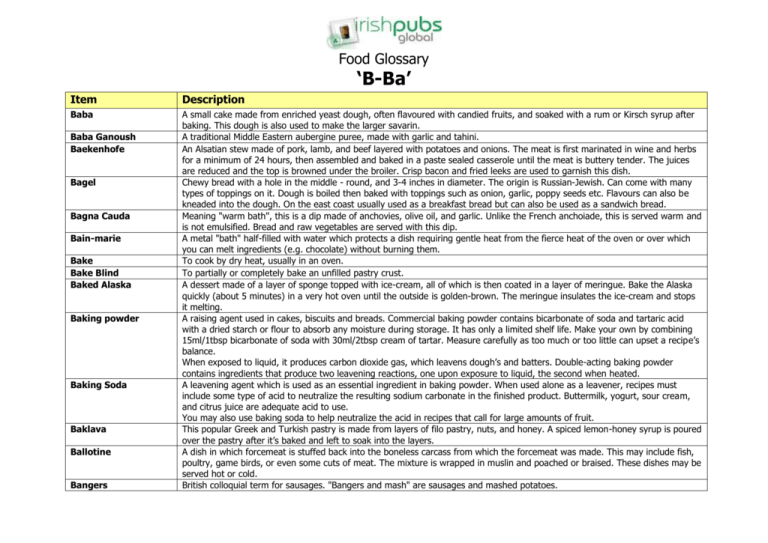
Food Glossary ‘B-Ba’ Item Description Baba A small cake made from enriched yeast dough, often flavoured with candied fruits, and soaked with a rum or Kirsch syrup after baking. This dough is also used to make the larger savarin. A traditional Middle Eastern aubergine puree, made with garlic and tahini. An Alsatian stew made of pork, lamb, and beef layered with potatoes and onions. The meat is first marinated in wine and herbs for a minimum of 24 hours, then assembled and baked in a paste sealed casserole until the meat is buttery tender. The juices are reduced and the top is browned under the broiler. Crisp bacon and fried leeks are used to garnish this dish. Chewy bread with a hole in the middle - round, and 3-4 inches in diameter. The origin is Russian-Jewish. Can come with many types of toppings on it. Dough is boiled then baked with toppings such as onion, garlic, poppy seeds etc. Flavours can also be kneaded into the dough. On the east coast usually used as a breakfast bread but can also be used as a sandwich bread. Meaning "warm bath", this is a dip made of anchovies, olive oil, and garlic. Unlike the French anchoiade, this is served warm and is not emulsified. Bread and raw vegetables are served with this dip. A metal "bath" half-filled with water which protects a dish requiring gentle heat from the fierce heat of the oven or over which you can melt ingredients (e.g. chocolate) without burning them. To cook by dry heat, usually in an oven. To partially or completely bake an unfilled pastry crust. A dessert made of a layer of sponge topped with ice-cream, all of which is then coated in a layer of meringue. Bake the Alaska quickly (about 5 minutes) in a very hot oven until the outside is golden-brown. The meringue insulates the ice-cream and stops it melting. A raising agent used in cakes, biscuits and breads. Commercial baking powder contains bicarbonate of soda and tartaric acid with a dried starch or flour to absorb any moisture during storage. It has only a limited shelf life. Make your own by combining 15ml/1tbsp bicarbonate of soda with 30ml/2tbsp cream of tartar. Measure carefully as too much or too little can upset a recipe’s balance. When exposed to liquid, it produces carbon dioxide gas, which leavens dough’s and batters. Double-acting baking powder contains ingredients that produce two leavening reactions, one upon exposure to liquid, the second when heated. A leavening agent which is used as an essential ingredient in baking powder. When used alone as a leavener, recipes must include some type of acid to neutralize the resulting sodium carbonate in the finished product. Buttermilk, yogurt, sour cream, and citrus juice are adequate acid to use. You may also use baking soda to help neutralize the acid in recipes that call for large amounts of fruit. This popular Greek and Turkish pastry is made from layers of filo pastry, nuts, and honey. A spiced lemon-honey syrup is poured over the pastry after it’s baked and left to soak into the layers. A dish in which forcemeat is stuffed back into the boneless carcass from which the forcemeat was made. This may include fish, poultry, game birds, or even some cuts of meat. The mixture is wrapped in muslin and poached or braised. These dishes may be served hot or cold. British colloquial term for sausages. "Bangers and mash" are sausages and mashed potatoes. Baba Ganoush Baekenhofe Bagel Bagna Cauda Bain-marie Bake Bake Blind Baked Alaska Baking powder Baking Soda Baklava Ballotine Bangers Food Glossary ‘B-Ba’ Item Description Bannock Bap Bara brith Barbarie Duck Originally applied to bread, this term loosely describes any large round scone or biscuit the size of a dinner plate. An oval-shaped white bread roll served for breakfast and also for sandwiches. A traditional cake-like fruit bread from Wales. Bred in large quantities in France, Barbary duck is less fatty than the common duck. It requires careful basting when cooking so that it doesn’t dry out. To cook over the embers or coals of an open fire. A highly-seasoned tomato-base sauce. To cover poultry or game with thin slices of bacon when roasting. Meaning to inject flavour and juice. The practice of wrapping lean cuts of meat to be with thin slices of back fat. The converse of this is larding, in which long strips of fat are inserted into the cut of meat to keep it moist during cooking. A small oval shaped pastry shell with either sweet or savoury fillings. Basmati is an Indian rice with very small but long grains, with a distinctive flavour. It should be rinsed before cooking. Food prepared in the style of Basque (Northern Spain) which often includes tomatoes and sweet or hot red peppers. A white sea fish with three varieties - silver, sea and striped - sold as steaks and fillets. Can be barbecued, grilled, steamed, poached or baked. Good with strong flavourings. To ladle drippings over a piece of meat being cooked as a roast to make it juicy and to prevent dryness. The process of spooning stock or fat over meat at intervals to prevent it drying out during roasting. Items cut into pieces somewhat larger than allumette or julienne; 1/4 inch x 1/4 inch x 2 to 2 1/2 inches is the standard. Translated to English as "stick" or "small stick." A mixture of flour and liquid, with sometimes the inclusion of other ingredients. Batters vary in thickness but are generally semiliquid and thinner than dough’s. Used in such preparations as cakes, quick breads, pancakes, and crepes. An expression, commonly used by top chefs, to describe the essential equipment every good cook needs for the preparation of food in the kitchen. A cream made with pastry cream lightened with whipped cream and stabilized with gelatine. This cream may then be poured into moulds, or used as a filling for cakes or pastries. Bavarian cream is often flavoured with fruit purees or alcohol. This wild mushroom is often found in areas where conifers grow. A member of the ‘cep’ family (cep in France, porcini in Italy), it is a robust and meaty mushroom that dries well. Often used in risottos or omelettes or simply fried with a little garlic. An evergreen shrub, cultivated for ornament and for its aromatic leaves. Bay leaves are one of the most commonly used culinary herbs: a leaf is always incorporated in a bouquet garni and is good for casseroles, stews and pickling. Bay doesn’t lose anything through being dried. Barbecue Barbecue Sauce Barder Barding Barquette Basmati rice Basquaise Bass Baste Basting Baton/Batonnet Batter Batterie de cuisine Bavarian Cream Bay boletes or boletus Bay leaves
